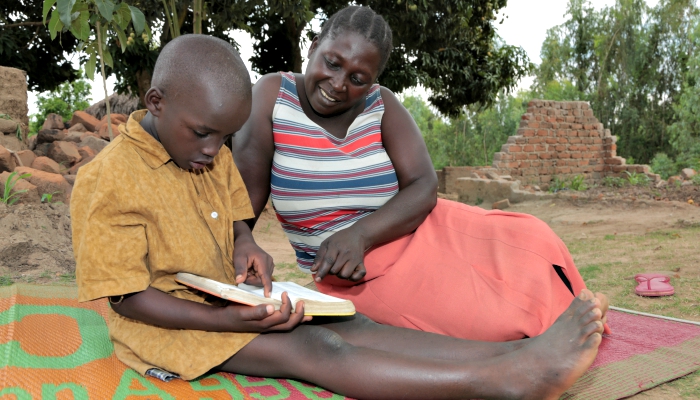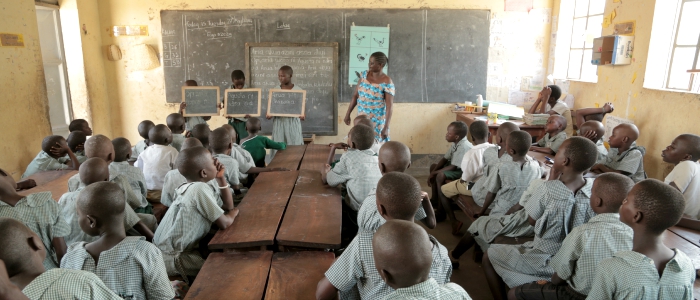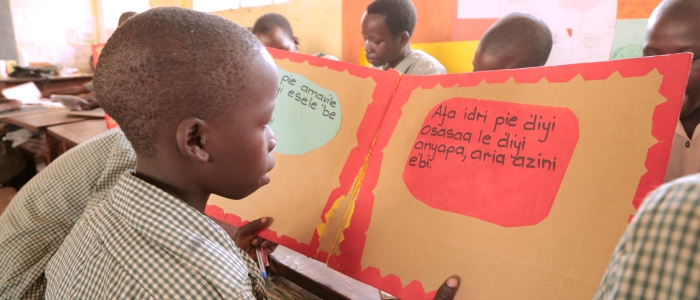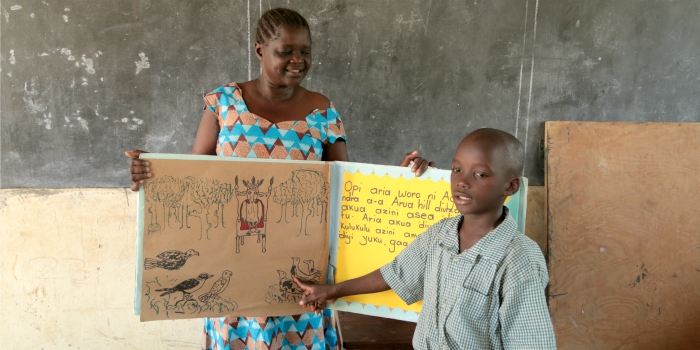
Night is falling in rural Uganda. Under a mango tree outside their home, Betty Dracelle and her seven-year-old son Acidiri settle onto a woven mat. It’s time for their evening ritual – a ritual shared by parents and children around the world.
They sit together, and they read.
For Betty and Acidiri, reading together is about more than quality family time. Acidiri’s teachers encourage all the parents in the community to read with their children – a strong predictor of academic success later in life.
Acidiri loves to play soccer and dreams of becoming a pilot. Betty, a widow, dropped out of high school when she became pregnant, but she sees a brighter future for her son.
“He is an intelligent boy,” says Betty, who now runs a stand in the local market. “I want him to study because he should stand on his own.”
A new chapter is beginning for children like Acidiri. According to UNICEF, more than 90 per cent of children in Uganda are now enrolled in primary school, and enrollment rates are similar in neighbouring countries like Kenya and Tanzania.
But enrollment only tells part of the story. For students to build a strong foundation of knowledge and skills, they need to attend schools with proper resources and well-trained teachers.

While Acidiri and his Grade 2 classmates have watched their older siblings graduate from seven years at Mvara Primary School barely able to read or do simple arithmetic, Acidiri’s classroom has been transformed through a program to improve education in the region, supported by Aga Khan Foundation Canada.
Repetitive rote learning is being replaced by interactive lessons, and Acidiri’s teacher has learned how to use recycled waste like cardboard boxes and plastic sacks to create inexpensive, effective learning materials that bring the lessons to life.
Encouraging students to read more is a key element of this program. Aside from building literacy and other academic skills, research shows that reading can improve memory, creativity, verbal and written expression, and self-confidence.
A senior trainer at Acidiri’s school, Aminah Kaherebu, says that “Library Hour” – 60 minutes of free reading time, twice a week – has become the most popular part of the school day.

“Children can read books, read cards, can do numeracy, can do counting, can do creative writing,” says Aminah. “The difference it makes is that [Library Hour] is very participatory. It’s very involving.”
These changes are happening in classrooms across Kenya, Tanzania, and Uganda, as part of a broad approach to improve education by investing in better learning environments, curricula, and teacher training programs, as well as research to inform education policy and practice.
The program also encourages communities to support local students, through activities like fundraising for a porridge breakfast program.
“My dream is to be able to see these children progress from one level to the other, and [to see] supportive parents who are enthusiastic to see their children grow into responsible citizens,” says Aminah. “I see a brilliant future [for Acidiri] because he is such an outgoing child who is enthusiastic to learn.”

Like any proud mother, Betty says she feels the same way. While Acidiri’s older siblings dropped out of high school, she hopes Acidiri will attend university.
But for now, Acidiri will continue to borrow books from the new community library – and in the evening, the aspiring pilot will read at home with his mother, and aim for the skies.
Want to learn more?
- See Acidiri’s story in action. Watch this video.
- To learn more about AKFC’s work to improve education in East Africa, view this photo gallery.
Financial support:
![]()
